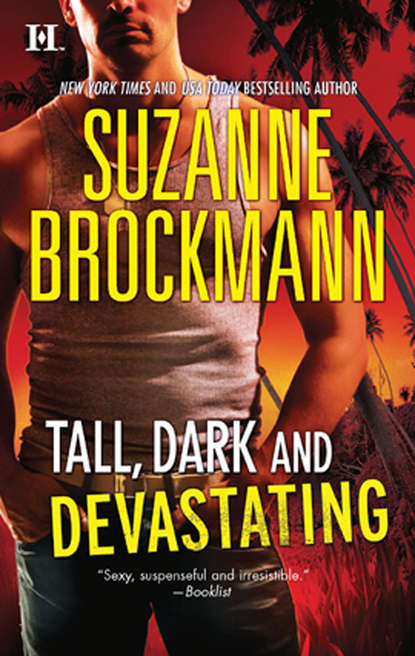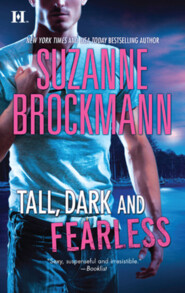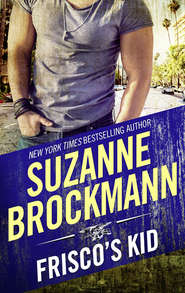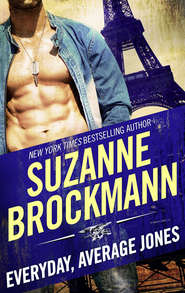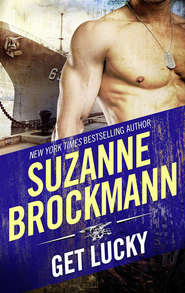По всем вопросам обращайтесь на: info@litportal.ru
(©) 2003-2025.
✖
Tall, Dark and Devastating: Harvard's Education
Автор
Год написания книги
2019
Настройки чтения
Размер шрифта
Высота строк
Поля
P.J. was silent. “Was that the same house your parents are moving out of today?” she finally asked.
He froze. “Where did you hear about that?”
She glanced at him. “Joe Cat told me.”
P.J. had been talking to Joe Cat about him. Harvard didn’t know whether to feel happy or annoyed. He’d be happy to know she’d been asking questions about him. But he’d be annoyed as hell if he found out that Joe had been attempting to play matchmaker.
“What, the captain just came over to you and said, guess what? Hot news flash—Harvard’s mom and pop are moving today?”
“No,” she said evenly. “He told me because I asked him if he knew what had caused the great big bug to crawl up your pants.”
She pushed herself forward to catch a wave before it broke and bodysurfed to shore like a professional—as if she’d been doing it all of her life.
She’d asked Joe. Harvard followed her out of the water feeling foolishly pleased. “It’s no big deal—the fact that they’re moving, I mean. I’m just being a baby about it.”
P.J. sat in the sand, leaned back against her elbows and stretched her legs out in front of her. “Your parents lived in the same house for, what? Thirty years?”
“Just about.” Harvard sat next to her. He stared at the ocean in an attempt to keep from staring at her legs. Damn, she had nice legs. It was impossible not to look, but he told himself that was okay, because he was making damn sure he didn’t touch. Still, he wanted to.
“You’re not being a baby. It is a big deal,” she told him. “You’re allowed to have it be a big deal, you know.”
He met her eyes, and she nodded. “You are allowed,” she said again.
She was so serious. She looked as if she were prepared to go into mortal combat over the fact that he had the right to feel confused and upset over his parents’ move. He felt his mouth start to curve into a smile, and she smiled, too. The connection between them sparked and jumped into high gear. Damn. When they had sex, it was going to be great. It was going to be beyond great.
But it wasn’t going to be today. If he were smart he’d rein in those wayward thoughts, keep himself from getting too overheated.
“It’s just so stupid,” he admitted. “But I’ve started having these dreams where suddenly I’m ten years old again, and I’m walking home from school and I get home and the front door’s locked. So I ring the bell and this strange lady comes to the screen. She tells me my family has moved, but she doesn’t know where. And she won’t let me in, and I just feel so lost, as if everything I’ve ever counted on is gone and… It’s stupid,” he said again. “I haven’t actually lived in that house for years. And I know where my parents are going. I have the address. I already have their new phone number. I don’t know why this whole thing should freak me out this way.”
He lay back in the sand, staring at the hazy sky.
“This opportunity is going to be so good for my father,” he continued. “I just wish I could have taken the time to go up there, help them out with the logistics.”
“Where exactly are they moving?” P.J. asked.
“Phoenix, Arizona.”
“No ocean view there.”
He turned to face her, propping his head on one hand. “That shouldn’t matter. I’m the one who liked the ocean view, and I don’t live with them anymore.”
“Where do you live?” she asked.
Harvard couldn’t answer that without consideration. “I have a furnished apartment here in Virginia.”
“That’s just temporary housing. Where do you keep your stuff?”
“What stuff?”
“Your bed. Your kitchen table. Your stamp collection. I don’t know, your stuff.”
He lay down, shaking his head. “I don’t have a bed or a kitchen table. And I used the last stamp I bought to send a letter to my little sister at Boston University.”
“How about your books?” P.J. ventured. “Where do you keep your books?”
“In a climate-controlled self-storage unit in Coronado, California.” He laughed and closed his eyes. “Damn, I’m pathetic, aren’t I? Maybe I should get a sign for the door saying Home Sweet Home.”
“Are you sure you ever really moved out of your parents’ house?” she asked.
“Maybe not,” he admitted, his eyes still closed. “But if that’s the case, I guess I’m moving out today, huh?”
P.J. hugged her legs to her chest as she sat on the beach next to the Alpha Squad’s Senior Chief.
“Maybe that’s why I feel so bad,” he mused. “It’s a symbolic end to my childhood.” He glanced at her, amusement lighting his eyes. “Which I suppose had to happen sooner or later, considering that in four years I’ll be forty.”
Harvard Becker was an incredibly beautiful-looking man. His body couldn’t have been more perfect if some artisan had taken a chisel to stone and sculpted it. But it was his eyes that continued to keep P.J. up at night. So much was hidden in their liquid brown depths.
It had been a bold move on her part to suggest they go off alone to walk. With anyone else, she wouldn’t have thought twice about it. But with everyone else, the boundaries of friendship weren’t so hard to define.
When it came to this man, P.J. was tempted to break her own rules. And that was a brand-new feeling for her. A dangerous feeling. She hugged her knees a little tighter.
“There was a lot wrong with that house in Hingham,” Harvard told her. “The roof leaked in the kitchen. No matter how many times we tried to fix it, as soon as it stormed, we’d need to get out that old bucket and put it under that drip. The pipes rattled, and the windows were drafty, and my sisters were always tying up the telephone. My mother’s solution to any problem was to serve up a hearty meal, and my old man was so immersed in Shakespeare most of the time he didn’t know which century it was.”
He was trying to make jokes, trying to bring himself out of the funk he’d been in, trying to pretend it didn’t matter.
“I couldn’t wait to move out, you know, to go away to school,” he said.
He was trying to make it hurt less by belittling his memories. And there was no way she was going to sit by and listen quietly while he did that.
“You know that dream you’ve been having?” she asked. “The one where you get home from school and your parents are gone?”
He nodded.
“Well, it didn’t happen to me exactly like that,” she told him. “But one day I came home from school and I found all our furniture out on the sidewalk. We’d been evicted, and my mother was gone. She’d vanished. She’d dealt with the bad news not by trying to hustle down a new apartment, but by going out on a binge.”
He pushed himself into a sitting position. “My God…”
“I was twelve years old,” P.J. said. “My grandmother had died about three months before that, and it was just me and Cheri—my mom. I don’t know what Cheri did with the rent money, but I can certainly guess. I remember that day like it was yesterday. I had to beg our neighbors to hold on to some of that furniture for us—the stuff that wasn’t already broken or stolen. I had to pick and choose which of the clothing we could take and which we’d have to leave behind. I couldn’t carry any of my books or toys or stuffed animals, and no one had any room to store a box of my old junk, so I put ’em in an alley, hoping they’d still be there by the time I found us another place to live.” She shot him a look. “It rained that night, and I never even bothered to go back. I knew the things in that box were ruined. I guess I figured I didn’t have much use for toys anymore, anyway.”
She took a deep breath. “But that afternoon, I loaded up all that I could carry of our clothes in shopping bags and I went looking for my mother. You see, I needed to find her in order to get a bed in the shelter that night. If I tried to go on my own, I’d be taken in and made a ward of the state. And as bad as things were with Cheri, I was afraid that would be even worse.”
Harvard swore softly.
“I’m not giving you the 411 to make you feel worse.” She held his gaze, hoping he would understand. “I’m just trying to show you how really lucky you were, Daryl. How lucky you are. Your past is solid. You should celebrate it and let it make you stronger.”
“Your mother…”
“Was an addict since before I can remember,” P.J. told him flatly. “And don’t even ask about my father. I’m not sure my mother knew who he was. Cheri was fourteen when she had me. And her mother was sixteen when she had her. I did the math and figured out if I followed in my family’s hallowed tradition, I’d be nursing a baby of my own by the time I was twelve. That’s the childhood I climbed out of. I escaped, but just barely.” She raised her chin. “But if there’s one thing I got from Cheri, it’s a solid grounding in reality. I am where I am today because I looked around and I said no way. So in a sense, I celebrate my past, too. But the party in my head’s not quite as joyful as the one you should be having.”





